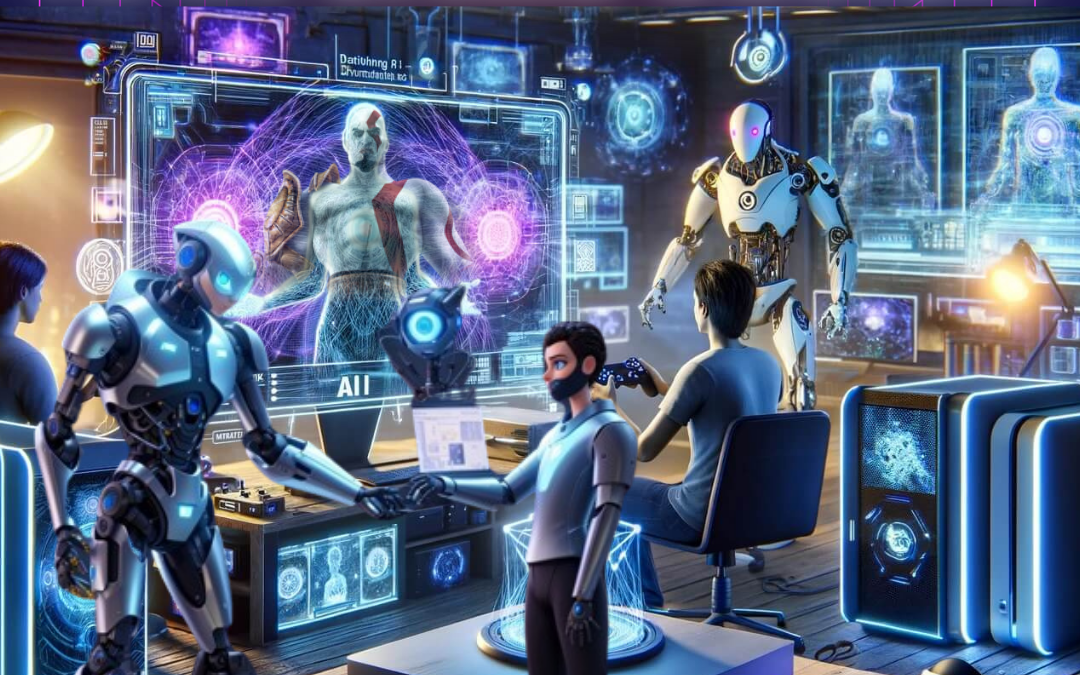The Transformative Influence of AI in Game Design
In the constantly changing world of gaming, one technology has truly made a big impact: artificial intelligence (AI). As time has gone on, AI has become a crucial part of game design, changing not just how games are made but also how players experience virtual worlds. From enhancing non-player character (NPC) behavior to revolutionizing procedural generation, the influence of AI in game design is profound and transformative.
Influence of AI in Game Design
One of the most noticeable impacts of AI in Gaming is seen in the lifelike behavior of NPCs. Gone are the days of predictable and static NPC movements; thanks to advanced AI algorithms, NPCs now exhibit more human-like behaviors and adaptability. Whether it’s reacting to player actions, simulating emotions, or learning from past encounters, AI-powered NPCs add depth and immersion to gaming experiences. Games like “Red Dead Redemption 2” and “The Last of Us Part II” showcase AI-driven characters that feel genuinely alive, enhancing the narrative and player engagement.
Moreover, AI has revolutionized procedural content generation, offering game developers endless possibilities for creating vast and dynamic virtual worlds. By leveraging AI algorithms, developers can generate terrain, populate environments, and design levels procedurally, reducing the need for manual content creation and enhancing scalability.
Furthermore, AI-driven procedural narrative generation is pushing the boundaries of storytelling in games. By analyzing player choices and interactions in real-time, AI algorithms can dynamically adjust the narrative flow, providing a personalized and immersive storytelling experience. Games like “Detroit: Become Human” and “Outer Wilds” utilize AI-driven narrative systems to create branching storylines and meaningful player-driven choices, offering unparalleled narrative depth and replay value.
Games such as “Minecraft” and “No Man’s Sky” utilize AI to create vast and varied landscapes, guaranteeing that each gameplay encounter is unique.. AI-powered tools and engines enable developers to automate repetitive tasks, optimize resource allocation, and streamline the game development pipeline. From generating art assets to debugging code, AI accelerates the development cycle, allowing developers to focus more on creativity and innovation. Game engines like Unity and Unreal Engine integrate AI-driven features that empower developers to create high-quality games with greater speed and accuracy.
Moreover, AI is democratizing game development by lowering the barriers to entry and empowering indie developers and hobbyists to create innovative and compelling games. With the rise of AI-powered game development platforms and tools, aspiring developers can leverage pre-trained models and algorithms to prototype ideas, experiment with game mechanics, and bring their visions to life. Platforms like GameSynth and RunwayML provide accessible AI-driven solutions for game development, democratizing access to cutting-edge technologies and fostering creativity and diversity in the gaming industry.
However, the transformative influence of AI in game design also raises ethical and societal considerations. As AI becomes more ingrained in gaming experiences, questions arise regarding data privacy, algorithmic bias, and the ethical implications of AI-driven decision-making in games. Game developers must navigate these ethical challenges responsibly, ensuring that AI-powered systems prioritize fairness, transparency, and user consent.


Recent Comments